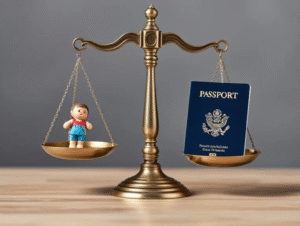Journing through family law in the United Kingdom can be a challenging and emotionally demanding experience, particularly for Asian and international clients unfamiliar with the UK’s legal system. Among the most pivotal aspects of family law disputes is the issue of child custody and parental responsibility. The UK courts approach these matters with a singular guiding principle: the welfare and best interests of the child.
When parents or guardians separate or divorce, the court may issue a Child Arrangements Order (CAO). This legally binding document outlines with whom the child will live and how, when, and under what circumstances they will have contact with the other parent. For those facing cross-border custody challenges, cultural barriers, or concerns about legal rights in a foreign jurisdiction, understanding the scope and power of this order is crucial.
At AA Grewal & Aggarwal Solicitors, we specialise in supporting clients from South Asian and international backgrounds. We understand the unique legal, cultural, and emotional dynamics involved in these cases. This guide offers a detailed explanation of Child Arrangements Orders, including the legal process, eligibility, enforcement, and modifications, with a focus on answering the complex concerns often raised by our global clientele.
Table of Contents
What Is a Child Arrangements Order?
A Child Arrangements Order (CAO) is issued by the Family Court under Section 8 of the Children Act 1989. It is used to determine the living arrangements for a child and how they will maintain a relationship with both parents following a separation. Unlike older terminology such as “custody” and “access,” the modern legal framework refers to “live with” and “spend time with/visit” provisions to emphasise a more balanced, child-focused approach.
A Child Arrangements Order is a legally enforceable document. If one parent consistently breaches the order — for example, refusing visitation or withholding the child — the other parent can apply to the court using Form C79. Enforcement options may include fines, unpaid work (community service), compensation for lost time with the child, or, in serious cases, imprisonment. Persistent non-compliance may even result in a change to the living arrangements.
Importantly, a Child Arrangements Order can also define indirect contact, such as communication via video call or letters, particularly relevant for international parents residing abroad or in situations where physical contact may not be immediately feasible due to travel restrictions or safeguarding concerns.
Who Can Apply for a Child Arrangements Order?
Not every individual automatically has the legal right to apply for a CAO. Under the UK law, parents, guardians, and those with parental responsibility can apply directly for a CAO. Others—such as grandparents or extended family—must first seek the court’s permission by demonstrating a meaningful role in the child’s life. This step is especially important for clients from cultures where caregiving often extends beyond parents. Individuals such as grandparents, extended family members, or non-parental carers must first obtain the leave (permission) to apply from the court. This preliminary step ensures that only applications that potentially serve the child’s interests proceed to a full hearing.
How Do UK Courts Decide Custody and Visitation?

UK courts are required to follow the Welfare Checklist set out in Section 1 of the Children Act 1989. This framework guides judges in making decisions that prioritise the child’s best interests. Courts consider the child’s wishes and feelings, taking into account their age and maturity. They also assess the child’s physical, emotional, and educational needs, as well as the likely impact of any changes in living arrangements. The risk of harm, including exposure to domestic abuse, is carefully examined. Each parent’s ability to meet the child’s needs is also evaluated.
It is important to note that UK courts do not favour mothers over fathers, and they do not discriminate based on a parent’s nationality, ethnicity, or religion. However, cultural factors may be relevant in certain cases, particularly where religion, language, or community ties play a central role in the child’s life.
Asian and international clients often have concerns about whether courts will respect religious practices, dietary customs, language use, or schooling preferences. These elements can indeed be taken into account, especially if a parent is proposing to relocate or significantly alter the child’s routine. In such cases, courts strive to balance cultural continuity with the child’s emotional and physical stability.
Why Choose AA Grewal & Aggarwal Solicitors?
We are a leading boutique firm in the UK that specialises in cross-border family law, with particular experience supporting clients from all over the globe. Our firm understands the nuances that arise when legal systems, cultures, and personal circumstances intersect.
Whether you are seeking to obtain, enforce, or modify a Child Arrangements Order, we provide strategic, culturally sensitive, and solution-focused legal services. Our multilingual team ensures no barrier to communication or understanding, and our commitment to your child’s welfare is unwavering.
Request a Confidential Consultation Today: If you’re an Asian or international client in the UK or abroad and need expert legal assistance on Child Arrangements Orders, contact AA Grewal & Aggarwal Solicitors today. We will help you safeguard your child’s future, preserve your parental rights, and guide you through the UK family law system with clarity and compassion.
Frequently Asked Questions (FAQs)
1. Can a non-UK resident parent apply for a Child Arrangements Order in the UK?
Yes, non-resident parents — including those living abroad — can apply for a Child Arrangements Order in the UK, provided the child is habitually resident in the UK. The court must have jurisdiction, typically determined by the child’s country of regular residence. For international clients, it’s crucial to act promptly if the child’s living arrangements are in dispute, particularly if there is a risk of international child abduction or unauthorised relocation. If you are living overseas, the court may allow your participation remotely and assess whether maintaining contact (in person or virtually) serves the child’s best interests. In such cases, legal advice from a UK family solicitor experienced in cross-border matters is essential.
2. What happens if one parent wants to relocate internationally with the child?
Relocating a child internationally without the consent of all parties with parental responsibility, or without a court order, may be considered child abduction under UK law. A parent seeking to move abroad with a child must apply for a Specific Issue Order, outlining their reasons for the move and demonstrating how it will benefit the child emotionally, educationally, and socially. Courts will assess whether the relocation aligns with the child’s welfare, considering their ties to the UK, existing contact with the other parent, and the proposed country’s stability.
3. Can a parent be denied contact with their child under a Child Arrangements Order?
Yes, in certain circumstances, the court may order no direct or indirect contact if it determines that contact would place the child at risk of emotional or physical harm. This is common in cases involving domestic violence, substance abuse, or neglect. However, the court prefers to maintain parent-child relationships where safely possible. In such cases, supervised contact or indirect contact (e.g., letters, video calls) may be ordered as a compromise, with provisions for gradual progression if conditions improve.
4. Can a Child Arrangements Order be enforced if the other parent refuses to comply?
Absolutely. A Child Arrangements Order is a legally enforceable document. If one parent consistently breaches the order — for example, refusing visitation or withholding the child — the other parent can apply to the court using Form C79. Enforcement options may include fines, unpaid work (community service), compensation for lost time with the child, or, in serious cases, imprisonment. Persistent non-compliance may even result in a change to the living arrangements.
For more details about the court procedures at length, click on: The Legal Process: How to Apply for a Child Arrangements Order.









